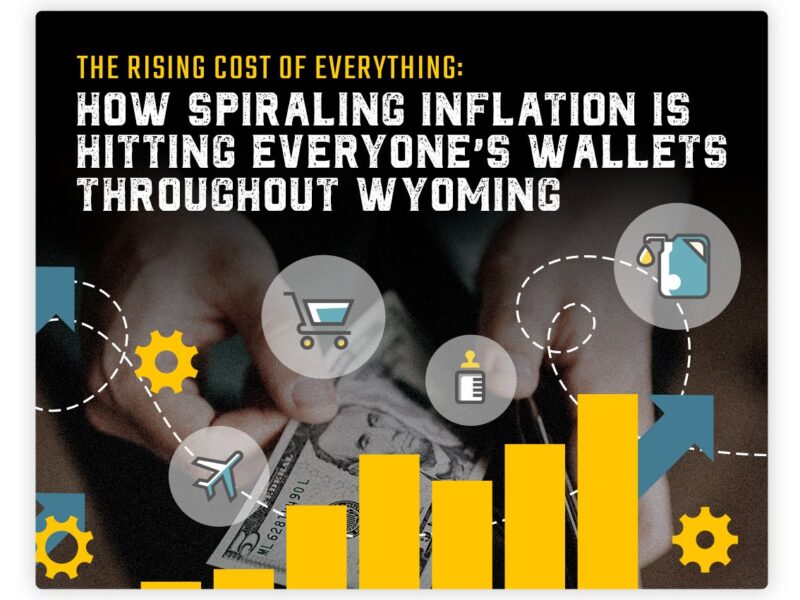THE RISING COST OF EVERYTHING: Wyoming Musicians Play on Despite Facing Higher Expenses
Soaring gas prices, cost to make merchandise lead Wyoming performers to shorten performance schedule
- Published In: Other News & Features
- Last Updated: Oct 16, 2022

By Jake Sorich
Special to the Wyoming Truth
Inflation is an equal opportunity offender – and musicians aren’t immune to its consequences. Just ask Dave and Julie Huebner, co-leaders of The Two Tracks, a Sheridan-based folk-Americana band.

They love to tour, but they can’t afford to hit the road as often as they did before gas prices spiked.
In the past, the Huebners, both 42, could fill their vehicle’s tank for $70, but the price has more than doubled to about $150. As a result, they have stayed closer to Wyoming and performed in Utah, South Dakota, California and Montana. In 2019, the group played over 60 shows, but in the past two years combined, they’ve performed only 65 in total.
The Huebners are not alone. In interviews with the Wyoming Truth, musicians said soaring prices for fuel, hotel rooms and food have caused them to scale back their tours. What’s more, the cost to record their music and produce the CDs, vinyl records and T-shirts they sell at shows has increased, too.
It’s something of a double-edged sword, because merchandise sales can allow bands to get back in the studio to record and then get back on the road, Huebner said.
For The Two Tracks, merchandise sales usually comprise up to 40 percent of the band’s annual profit. Production costs have jumped almost 15 percent in 2022, prompting the band to hike the price of some items just to break even.
While recording has always been expensive, inflation is making it nearly cost prohibitive for some musicians. On average, it can cost up to $10,000 to rent time in upscale studios.

In 2020, The Two Tracks raised $22,337 on Kickstarter from over 300 backers to record their latest album. Huebner said that funding covered most, but not all, of their other expenses.
“We did get burned by the (COVID-19) pandemic a little bit with our timing on that album,” said Huebner, a guitarist who formed the band in 2015 and works as a marketing specialist at Sheridan College when he’s not touring.
While Huebner understands how other bands might get frustrated by the economic downturn, they’ve not yet had to make huge sacrifices.
“Perhaps if [inflation] continues or worsens we will feel the pinch more,” he said. “[But] for now, we’re happy touring a little bit less and focusing on the better gigs.”
Other musicians have found a different way to afford the ever-increasing cost of recording. Ryan Hayes, co-founder and lead vocalist of the metalcore band Righteous Vendetta, managed recording costs by doing it himself.

“Eight years ago, I realized I needed to learn to work in the studio and learn the software required to record just out of necessity,” said Hayes, 32.
Hayes formed Righteous Vendetta 15 years ago in Cody. He knew the band had made an impact in the music industry when they toured across the western United States with the heavy metal supergroup Hellyeah in 2017.
Despite that success, Hayes still works other jobs to get by. He serves as a manager for country music artist Jonah Prill of Billings, Mont., and trades in cryptocurrency, among others.
“You can’t be a one-trick pony in the music business anymore,” Hayes said. “You’ve got to have your hand in a lot of stuff to survive. That’s just how it is unless you get lucky.”
Jay Shogren, 64, lead singer of the “Catawampus Americana” act Shogren Shanghai’d, felt similar pains from inflation when he started his music career in the 1970s.
Shogren was touring in Minnesota when Prince took off “not like a rocket, but a comet.” That made it harder for him to book shows. Shogren eventually stopped performing and enrolled in graduate school. Today he is an economics professor at the University of Wyoming.
Shogren said some venues pay out at the same rate as they did decades ago. It’s no surprise that artists are feeling the pinch of inflation, but he said he understands their drive to play on.
“Here in Laramie, we have the Ruffed Up Duck Saloon,” Shogren said. “It’s kind of a little venue, but we still get acts through here … sometimes five nights a week. When they come in, somebody might have a couch for them, or they’ll pitch a tent . . . Inflation doesn’t always slow down the dream.”













